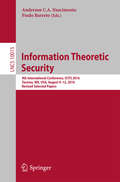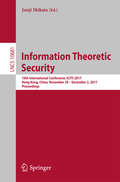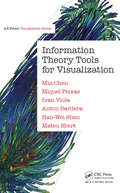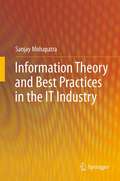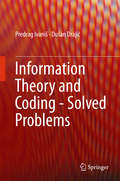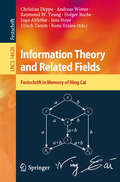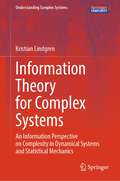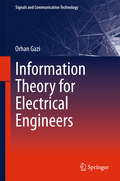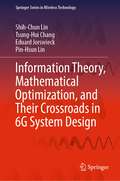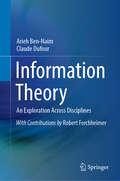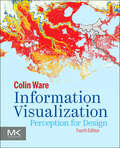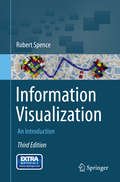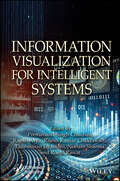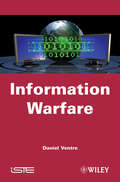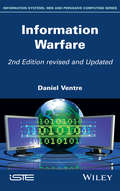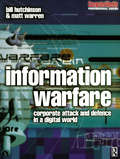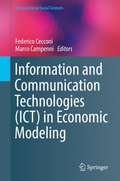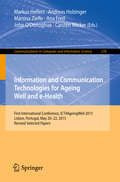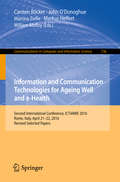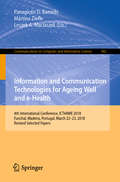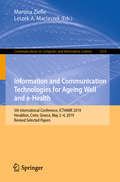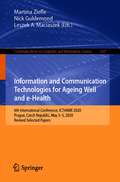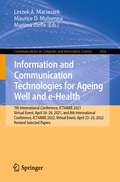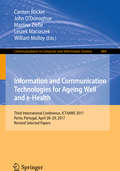- Table View
- List View
Information Theoretic Security
by Anderson C.A. Nascimento Paulo BarretoThis book constitutes the thoroughly refereed proceedings fo the 9th International Conference on Information Theoretic Security, ICITS 2016, held in Tacoma, WA, USA, in August 2016. The 14 full papers presented in this volume were carefully reviewed and selected from 40 submissions. They are organized around the following topics: secret sharing; quantum cryptography; visual cryptography; cryptographic protocols; entropy, extractors and privacy.
Information Theoretic Security: 10th International Conference, ICITS 2017, Hong Kong, China, November 29 – December 2, 2017, Proceedings (Lecture Notes in Computer Science #10681)
by Junji ShikataThis book constitutes the refereed proceedings of the 10th International Conference on Information Theoretic Security, ICITS 2017, held in Hong Kong, China, in November/December 2017.The 12 full papers were carefully reviewed and selected from 42 submissions. They are organized around the following topics: quantum cryptography; quantum information theory; post-quantum cryptography (e.g. lattices and cryptography); physical layer security; wiretap channels; adversarial channel models; cryptography from noisy channels; bounded storage models; network coding security; biometric security; randomness extraction; key and message rates; secret sharing; authentication codes; multiparty computations; information theoretic reductions; and implementation challenges.
Information Theory And Coding By Example
by Mark Kelbert Yuri SuhovThis fundamental monograph introduces both the probabilistic and algebraic aspects of information theory and coding. It has evolved from the authors' years of experience teaching at the undergraduate level, including several Cambridge Maths Tripos courses. The book provides relevant background material, a wide range of worked examples and clear solutions to problems from real exam papers. It is a valuable teaching aid for undergraduate and graduate students, or for researchers and engineers who want to grasp the basic principles.
Information Theory Tools for Visualization (AK Peters Visualization Series)
by Min Chen Miquel Feixas Ivan Viola Anton Bardera Han-Wei Shen Mateu SbertThis book explores Information theory (IT) tools, which have become state of the art to solve and understand better many of the problems in visualization. This book covers all relevant literature up to date. It is the first book solely devoted to this subject, written by leading experts in the field.
Information Theory and Best Practices in the IT Industry
by Sanjay MohapatraThe importance of benchmarking in the service sector is well recognized as it helps in continuous improvement in products and work processes. Through benchmarking, companies have strived to implement best practices in order to remain competitive in the product- market in which they operate. However studies on benchmarking, particularly in the software development sector, have neglected using multiple variables and therefore have not been as comprehensive. Information Theory and Best Practices in the IT Industry fills this void by examining benchmarking in the business of software development and studying how it is affected by development process, application type, hardware platforms used, and many other variables. Information Theory and Best Practices in the IT Industry begins by examining practices of benchmarking productivity and critically appraises them. Next the book identifies different variables which affect productivity and variables that affect quality, developing useful equations that explaining their relationships. Finally these equations and findings are applied to case studies. Utilizing this book, practitioners can decide about what emphasis they should attach to different variables in their own companies, while seeking to optimize productivity and defect density.
Information Theory and Coding - Solved Problems
by Predrag Ivaniš Dušan DrajićThis book is offers a comprehensive overview of information theory and error control coding, using a different approach then in existed literature. The chapters are organized according to the Shannon system model, where one block affects the others. A relatively brief theoretical introduction is provided at the beginning of every chapter, including a few additional examples and explanations, but without any proofs. And a short overview of some aspects of abstract algebra is given at the end of the corresponding chapters. The characteristic complex examples with a lot of illustrations and tables are chosen to provide detailed insights into the nature of the problem. Some limiting cases are presented to illustrate the connections with the theoretical bounds. The numerical values are carefully selected to provide in-depth explanations of the described algorithms. Although the examples in the different chapters can be considered separately, they are mutually connected and the conclusions for one considered problem relate to the others in the book.
Information Theory and Related Fields: Festschrift in Memory of Ning Cai (Lecture Notes in Computer Science #14620)
by Andreas Winter Holger Boche Ingo Althöfer Christian Deppe Ulrich Tamm Jens Stoye Raymond W. Yeung Rami EzzineNing Cai was an eminent mathematician, engineer and computer scientist who made many significant contributions to information theory. In particular, his work on network coding theory created a new research direction for the community. Prof. Cai’s passion for science inspired his collaborators across the fields of classical and quantum information theory, combinatorics, computation, post-Shannon theory, and coding theory, and the contributions in this volume reflect his success as a researcher and mentor.
Information Theory for Complex Systems: An Information Perspective on Complexity in Dynamical Systems and Statistical Mechanics (Understanding Complex Systems)
by Kristian LindgrenThis book introduces a comprehensive framework tailored for dissecting complex systems across diverse disciplines. What defines a complex system? How can we harness information to quantify its order, structure, and intricacy? Delving into phenomena from the intricate processes in physical systems to the dynamic behaviours in cellular automata and pattern formation, readers will uncover the profound interplay between physics and information theory. This intricate relationship provides fresh insight into physical phenomena, reimagining them through the lens of information. Notably, the book demystifies how seemingly opposing forces—rising order and increasing disorder—coexist, ultimately shedding light on the second law of thermodynamics as an outcome of deterministic, reversible dynamics beneath the surface. Geared towards graduate students, this book presumes an undergraduate foundation in mathematics and physics, ensuring a deep, engaging exploration for its readers.
Information Theory for Electrical Engineers (Signals And Communication Technology)
by Orhan GaziThis book explains the fundamental concepts of information theory, so as to help students better understand modern communication technologies. It was especially written for electrical and communication engineers working on communication subjects. The book especially focuses on the understandability of the topics, and accordingly uses simple and detailed mathematics, together with a wealth of solved examples.The book consists of four chapters, the first of which explains the entropy and mutual information concept for discrete random variables. Chapter 2 introduces the concepts of entropy and mutual information for continuous random variables, along with the channel capacity. In turn, Chapter 3 is devoted to the typical sequences and data compression. One of Shannon’s most important discoveries is the channel coding theorem, and it is critical for electrical and communication engineers to fully comprehend the theorem. As such, Chapter 4 solely focuses on it.To gain the most from the book, readers should have a fundamental grasp of probability and random variables; otherwise, they will find it nearly impossible to understand the topics discussed.
Information Theory, Mathematical Optimization, and Their Crossroads in 6G System Design (Springer Series in Wireless Technology)
by Shih-Chun Lin Tsung-Hui Chang Eduard Jorswieck Pin-Hsun LinThis book provides a broad understanding of the fundamental tools and methods from information theory and mathematical programming, as well as specific applications in 6G and beyond system designs. The contents focus on not only both theories but also their intersection in 6G. Motivations are from the multitude of new developments which will arise once 6G systems integrate new communication networks with AIoT (Artificial Intelligence plus Internet of Things). Design issues such as the intermittent connectivity, low latency, federated learning, IoT security, etc., are covered. This monograph provides a thorough picture of new results from information and optimization theories, as well as how their dialogues work to solve aforementioned 6G design issues.
Information Theory: An Exploration Across Disciplines
by Arieh Ben-Naim Claude DufourThis monograph explores the interdisciplinary applications of information theory, focusing on the concepts of entropy, mutual information, and their implications in various fields. It explains the fundamental differences between entropy and Shannon’s Measure of Information (SMI), presents the application of information theory to living systems and psychology, and also discusses the role of entropy in art. It critically overviews the definition of correlations and multivariate mutual information.These notions are used to build a new perspective for understanding the irreversibility of processes in macroscopic systems, while the dynamical laws governing the microscopic components are reversible. It also delves into the use of mutual information in linguistics, cryptography, steganography, and communication systems. The book details the theoretical and practical aspects of information theory across a spectrum of disciplines and is a useful tool for any scientist interested in what is usually called entropy.
Information Visualization
by Colin WareInformation Visualization: Perception for Design, Fourth Edition explores the art and science of why we see objects the way we do. Based on the science of perception and vision, the author presents the key principles at work for a wide range of applications--resulting in visualization of improved clarity, utility and persuasiveness. This new edition has been revised and updated to include the latest relevant research findings. Content has been updated in areas such as the cognitive neuroscience of maps and navigation, the neuroscience of pattern perception, and the hierarchy of learned patterns. New changes to the book make it easier to apply perceptual lessons to design decisions. In addition, the book offers practical guidelines that can be applied by anyone, including interaction designers and graphic designers of all kinds. <P> Includes the latest research findings in visualization and perception - Provides a new chapter on designing for perception to help bridge the gap between specific perception-based guidelines and common design decisions - Presents over 400 informative, full color illustrations that are key to an understanding of the subject
Information Visualization
by Robert SpenceInformation visualization is the act of gaining insight into data, and is carried out by virtually everyone. It is usually facilitated by turning data - often a collection of numbers - into images that allow much easier comprehension. Everyone benefits from information visualization, whether internet shopping, investigating fraud or indulging an interest in art. So no assumptions are made about specialist background knowledge in, for example, computer science, mathematics, programming or human cognition. Indeed, the book is directed at two main audiences. One comprises first year students of any discipline. The other comprises graduates - again of any discipline - who are taking a one- or two-year course of training to be visual and interaction designers. By focusing on the activity of design the pedagogical approach adopted by the book is based on the view that the best way to learn about the subject is to do it, to be creative: not to prepare for the ubiquitous examination paper. The content of the book, and the associated exercises, are typically used to support five creative design exercises, the final one being a group project mirroring the activity of a consultancy undertaking a design (not an implementation) for a client. Engagement with the material of this book can have a variety of outcomes. The composer of a school newsletter and the applicant for a multi-million investment should both be able to convey their message more effectively, and the curator of an exhibition will have new presentational techniques on their palette. For those students training to be visual/interaction designers the exercises have led to original and stimulating outcomes.
Information Visualization for Intelligent Systems
by Neelam Sharma Elammaran Jayamani Romil Rawat Rajesh Kumar Chakrawarti Premanand Singh Chauhan Rajesh AryaInformation Visualization for Intelligent Systems provides readers with essential insights into cutting-edge advancements in machine intelligence and explores how these transformative technologies are revolutionizing data analysis and decision-making in an increasingly complex world. The book explores advanced computing, or machine intelligence, which enables technology—machines, devices, or algorithms—to interact intelligently with their surroundings, make decisions, and take actions to achieve objectives. Unlike natural human intelligence, artificial intelligence (AI) is demonstrated by machines. Modern advancements in high-speed computing drive paradigm shifts, enabling complex machine intelligence systems and novel cyber systems that utilize data to perform specific tasks. While standalone cyber systems are common, integrating multiple systems into cohesive, intelligent structures interacting deeply with physical systems remains underexplored and primarily philosophical in existing literature. These technological breakthroughs have revolutionized data generation, cloud storage, global information exchange, and rapid computing. For example, machine intelligence models analyze video surveillance to identify threats, support early infection detection in healthcare, and enhance chemical industry processes. While promising, these advancements remain in their infancy, offering significant potential for further development.
Information Warfare
by Daniel VentreThis book introduces policy, government, and security professionals to the concept of "information warfare," covering its evolution over the last decade and its developments among such economic and political giants as China, Russia, Japan, India, and Singapore. The text describes various conceptions of information warfare, along with how they function in military, diplomatic, political, and economic contexts. Recent notable cyber attacks are analyzed, the challenges faced by countries who fail to secure their cyberspace (Japan, the US, etc.) are enumerated, and ways to distinguish between cybercrime, cyberwarfare, and cyberterrrorism are discussed.
Information Warfare
by Daniel VentreCyberspace is one of the major bases of the economic development of industrialized societies and developing. The dependence of modern society in this technological area is also one of its vulnerabilities. Cyberspace allows new power policy and strategy, broadens the scope of the actors of the conflict by offering to both state and non-state new weapons, new ways of offensive and defensive operations. This book deals with the concept of "information war", covering its development over the last two decades and seeks to answer the following questions: is the control of the information space really possible remains or she a utopia? What power would confer such control, what are the benefits?
Information Warfare
by Matthew Warren William HutchinsonThis text introduces the concepts of information warfare from a non-military, organizational perspective. It is designed to stimulate managers to develop policies, strategies, and tactics for the aggressive use and defence of their data and knowledge base. The book covers the full gambit of information warfare subjects from the direct attack on computer systems to the more subtle psychological technique of perception management. It provides the framework needed to build management strategies in this area. The topics covered include the basics of information warfare, corporate intelligence systems, the use of deception, security of systems, modes of attack, a methodology to develop defensive measures, plus specific issues associated with information warfare. This book will be of interest to executives and managers in any public or private organization. Specifically, managers or staff in the areas of information technology, security, knowledge management, public relations, or marketing should find it directly useful.Its main purpose is to make readers aware of the new world of information saturation; thus decreasing the chance that they will become victims of those abusing the information age, whilst at the same time increasing their chances of benefiting from the new opportunities produced.
Information and Communication Technologies (Computational Social Sciences)
by Federico Cecconi Marco CampennìThis book presents the effects of integrating information and communication technologies (ICT) and economic processes in macroeconomic dynamics, finance, marketing, industrial policies, and in government economic strategy. The text explores modeling and applications in these fields and also describes, in a clear and accessible manner, the theories that guide the integration among information technology (IT), telecommunications, and the economy, while presenting examples of their applications. Current trends such as artificial intelligence, machine learning, and big data technologies used in economics are also included. This volume is suitable for researchers, practitioners, and students working in economic theory and the computational social sciences.
Information and Communication Technologies for Ageing Well and e-Health
by Andreas Holzinger Markus Helfert Carsten Röcker Martina Ziefle Ana Fred John O'DonoghueThis book constitutes the thoroughly refereedproceedings of the International Conference on Communication Technologies forAgeing Well and e-Health, ICT4AgeingWell 2015, held in Lisbon, Portugal, in May2015. The 11 full papers and two invited papers presented were carefully reviewed andselected from 45 submissions. The papers cover five main topic areas, covering different aspects, including Ambient AssistedLiving, Telemedicine and E-Health, Monitoring, Accessibility and UserInterfaces, Robotics and Devices for Independent Living and HCI for Ageing Populations.
Information and Communication Technologies for Ageing Well and e-Health
by Markus Helfert Carsten Röcker Martina Ziefle John O'Donoghue William MolloyThis book constitutes the thoroughly refereed proceedings of the International Conference on Communication Technologies for Ageing Well and e-Health, ICT4AWE 2016, held in Rome, Italy, in April 2016. The 8 full papers presented were carefully reviewed and selected from 39 submissions. The papers present relevant trends of current research on ageing well and e-health, including: ambient assisted living, mobile assistive technology, lifestyle engineering and life quality, electronic health records, security and privacy in e-Health, smart environments, home care and remote monitoring.
Information and Communication Technologies for Ageing Well and e-Health: 4th International Conference, ICT4AWE 2018, Funchal, Madeira, Portugal, March 22–23, 2018, Revised Selected Papers (Communications in Computer and Information Science #982)
by Leszek A. Maciaszek Martina Ziefle Panagiotis D. BamidisThis book constitutes the thoroughly refereed proceedings of the third International Conference on Communication Technologies for Ageing Well and e-Health, ICT4AWE 2018, held in Funchal, Madeira, Portugal in March 2018.The 10 full papers presented were carefully reviewed and selected from 32 submissions. The papers aim at contributing to the understanding of relevant trends of current research on ICT for Ageing Well and eHealth including the ambient assisted living.
Information and Communication Technologies for Ageing Well and e-Health: 5th International Conference, ICT4AWE 2019, Heraklion, Crete, Greece, May 2–4, 2019, Revised Selected Papers (Communications in Computer and Information Science #1219)
by Leszek A. Maciaszek Martina ZiefleThis book constitutes the thoroughly refereed proceedings of the third International Conference on Communication Technologies for Ageing Well and e-Health, ICT4AWE 2019, held in Heraklion, Crete, Greece in May 2019.The 9 full papers presented were carefully reviewed and selected from 52 submissions. The papers aim at contributing to the understanding of relevant trends of current research on ICT for Ageing Well and eHealth including the ambient assisted living.
Information and Communication Technologies for Ageing Well and e-Health: 6th International Conference, ICT4AWE 2020, Prague, Czech Republic, May 3–5, 2020, Revised Selected Papers (Communications in Computer and Information Science #1387)
by Leszek A. Maciaszek Martina Ziefle Nick GuldemondThis book constitutes the revised, selected and extended papers of the 6th International Conference on Communication Technologies for Ageing Well and e-Health, ICT4AWE 2020, held in Prague, Czech Republic, in May 2020. Due to the COVID-19 pandemic the conference was held online. The 7 full papers presented were carefully reviewed and selected from 50 submissions. The papers present most recent research on best practices, innovation and technical improvements in the fields of age and health care, education, psychology, social coordination and ambient assisted living.
Information and Communication Technologies for Ageing Well and e-Health: 7th International Conference, ICT4AWE 2021, Virtual Event, April 24–26, 2021, and 8th International Conference, ICT4AWE 2022, Virtual Event, April 23–25, 2022, Revised Selected Papers (Communications in Computer and Information Science #1856)
by Leszek A. Maciaszek Martina Ziefle Maurice D. MulvennaThis book constitutes the refereed post-conference proceedings of the 7th and the 8th International Conference on Big Data Technologies and Applications, ICT4AWE 2021 and ICT4AWE 2022, held in April 24–26, 2021 and April 23–25, 2022. Due to COVID-19 pandemic both conferences were held virtually.The 21 full papers of ICT4AWE 2021 and ICT4AWE 2022 were selected from 80 submissions and present all big data technologies, such as Aging Well - Social and Human Sciences Perspective; Telemedicine and Independent Living; Digital Health and e-health.
Information and Communication Technologies for Ageing Well and e-Health: Third International Conference, ICT4AWE 2017, Porto, Portugal, April 28-29, 2017, Revised Selected Papers (Communications in Computer and Information Science #869)
by Carsten Röcker Martina Ziefle Leszek Maciaszek William Molloy John O’DonoghueThis book constitutes the thoroughly refereed proceedings of the third International Conference on Communication Technologies for Ageing Well and e-Health, ICT4AWE 2017, held in Porto, Portugal in April 2017. The 10 full papers presented were carefully reviewed and selected from 32 submissions. The papers aim at contributing to the understanding of relevant trends of current research on ICT for Ageing Well and eHealth including the collection and evaluation of day/night end user behavior patterns through the adoption of wearable technologies.
